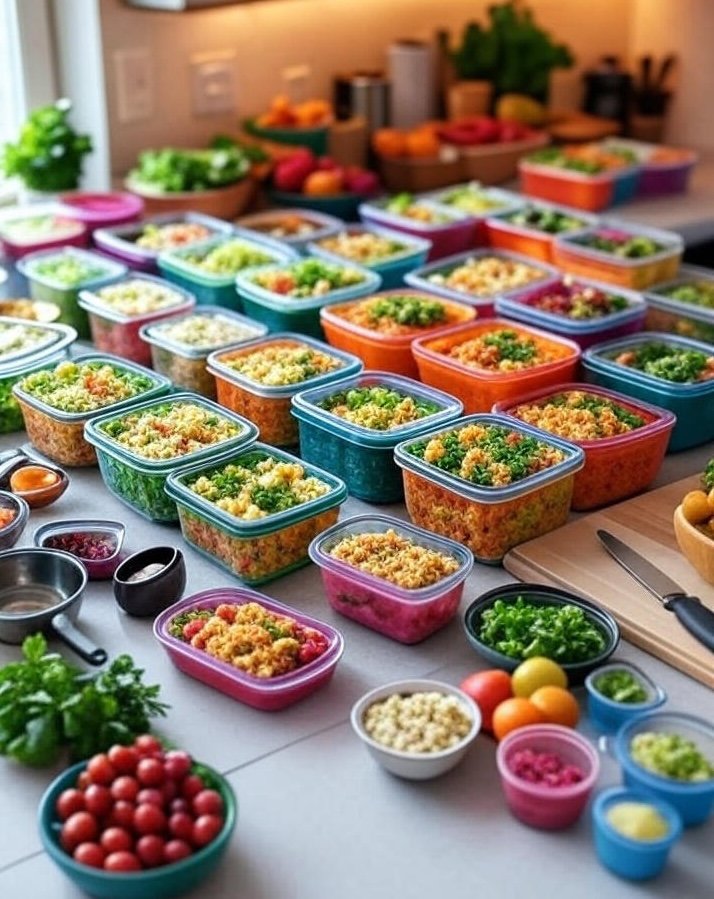Are you struggling to eat nutritious food while managing a hectic schedule? Meal prep could be the lifesaver you need. By planning and preparing your meals in advance, you can enjoy delicious dishes without the stress and chaos of cooking each day. In today’s fast-paced world, where time is a precious commodity, meal prepping can help ensure you maintain healthy eating habits and relieve some of the burdens that come with a busy schedule. This article aims to provide you with practical strategies for efficient meal prep, helping you save time and enjoy meals throughout the week.
In this comprehensive guide, we will cover various aspects of meal prep, including planning your meals, selecting the right ingredients, utilizing time-saving kitchen gadgets, and organizing your storage systems. By the end of the article, you will not only understand the concept of meal prepping but will also be equipped with the tools and techniques needed to implement it effectively. Whether you’re a seasoned cook or a beginner in the kitchen, you’ll find valuable tips to make this process work for you and your lifestyle.
Stick with us as we delve into the fascinating world of meal prep and discover how it can transform your approach to cooking, time management, and healthy eating. Prepare to take control of your meals and reclaim your weekends!
Planning Your Meals: The First Step Toward Success
To embark on your meal prep journey, planning is essential. Begin by mapping out a week’s worth of meals. This exercise helps you visualize your food intake and simplifies grocery shopping. Key to effective meal prep is variety; aim to include different proteins, grains, and vegetables throughout the week. Not only does this enhance flavor, but it also ensures you receive a balanced array of nutrients. By identifying meals that can utilize leftover ingredients, you can significantly cut down on waste and cooking time during the week.
Creating a meal plan allows you to assess what you enjoy eating and how you can remain healthy while indulging in your favorites. Consider looking up recipes that appeal to you or keeping an eye on what’s currently in season to save on costs and guarantee freshness. While planning, consider how much time you have during the week. Opting for quick, easy-to-prepare meals on weekdays is smart, while more intricate dishes can be saved for your free time.
Once you have a list of meals, it’s time to make a thorough grocery list. Choose ingredients that complement each other to maximize their use throughout the week. By sticking to your list, you can avoid impulsive purchases and ensure your pantry and refrigerator are stocked with only what you need for your healthy eating plan.
Choosing Nutritious Ingredients for Flavor and Health
Ingredients can significantly impact the overall quality of your meals, so it’s paramount to choose wisely. Prioritize fresh produce, lean proteins, and whole grains in your meal prep. Seasonal vegetables not only elevate your meals’ taste and nutrition but are also often more affordable. Foods like kale, asparagus, and bell peppers can be used in salads, stir-fries, or roasted dishes, providing you with versatility and color in your meals.
When selecting proteins, aim for lean options such as chicken, fish, beans, and legumes. These foods contribute to muscle repair and overall health while keeping calorie counts manageable. Whole grains, such as brown rice, quinoa, and farro, serve as excellent bases that are hearty and filling, perfect for maintaining energy throughout your busy schedule. Incorporating these elements into your meal prep not only supports healthy eating but also ensures you’re giving your body the fuel it needs.
Don’t forget about the importance of herbs and spices in enhancing flavor without extra calories. Experimenting with different combinations can make the same basic ingredients feel brand new or even transform leftover dishes into something exciting. By being mindful of your ingredient choices, you can delight in your meals while nurturing your health.
Utilizing Time-Saving Kitchen Gadgets
In today’s culinary world, countless kitchen gadgets can simplify the meal prep process. Investing in time-saving appliances can dramatically change your cooking experience and help streamline your meal prep routine. For instance, slow cookers allow you to toss ingredients in, set it, and walk away. By returning hours later, your meal is cooked and ready to serve. Similarly, instant pots can greatly reduce cooking times while still providing tender and flavorful meals with minimal effort.
Food processors are another excellent addition to your meal prep toolkit. They can significantly minimize chopping and prep time, making the task of preparing vegetables or grains less daunting. If you’re a fan of roasted veggies, a good-quality air fryer can roast food quickly while keeping it crispy and delicious without excessive oil. The right gadgets can help you prepare healthier meals in less time, allowing you more freedom within your busy schedule.
To maximize your investment in these gadgets, take some time to research their functions and how you can use them effectively. Many modern appliances come with multiple functionalities, meaning you can replace several devices with just one. This not only saves space but also streamlines the overall cooking process, giving you back valuable hours in your week.
Storage Solutions: Keeping Your Meals Fresh
Once your meals are prepped, the next step is storage. Properly storing your prepped meals is crucial for maintaining freshness and ensuring the quality of your food. When selecting containers, prioritize BPA-free plastic or glass options. These materials are durable, microwave-safe, and dishwasher-friendly, ensuring they’ll last for many meal prep cycles.
Investing in a variety of container sizes is beneficial, permitting flexibility in portion sizes according to the meal. For instance, smaller containers can be utilized for snacks or side dishes, while larger containers accommodate main meals. When storing your leftovers, make sure to label each container with the contents and date prepared. This simple practice not only prevents food waste but also helps you understand what you have on hand and when it should be consumed.
For optimal organization, arrange your containers in your refrigerator so that the most accessible meals are at the front. This way, grabbing a healthy option becomes seamless as you rush out the door on a busy morning. When it comes to meal prep, good storage can mean the difference between indulging in a quick, healthy meal and opting for less nutritious last-minute options.
Establishing a Consistent Meal Prep Routine
To truly integrate meal prep into your lifestyle, setting aside a specific time each week for this task is essential. Many find that Sundays work best for meal prepping, but any day that suits your schedule will do. During this time, focus on batch cooking larger meals that can last several days, like soups, stews, or casseroles. These meals can be easily portioned out into smaller servings and stored for quick access throughout the week.
Using your dedicated prep time for cleaning and organizing your kitchen can also establish a pleasant cooking environment, making the experience more enjoyable. A tidy kitchen can inspire creativity and efficiency, making it less likely you’ll turn to takeout when you’re tired after a long day. Additionally, consider involving family members or roommates in the process. Meal prepping can become a fun activity that everyone can still benefit from.
As you establish your routine, you’ll find that meal prepping becomes less of a chore and more of a rewarding habit. With time, you’ll perfect your process, ensuring that healthy, nutritious meals are always on hand, no matter how busy your week gets.
Addressing Common FAQ About Meal Prep
Starting anything new often comes with questions, and meal prep is no exception. One common inquiry is, “How long does meal prep typically take?” While this can vary based on the complexity of your meals, many people report that a solid meal prep session lasts about two to three hours once a week. With practice, you may streamline your process, making it quicker over time.
Another important question is, “What meals are ideal for prepping for an entire week?” Dishes like casseroles, soups, and grain bowls are perfect for meal prep, as they maintain their quality throughout the week. Meals that can be reheated while retaining their taste and texture tend to be the best options. Stir-fries, roasted vegetables, and marinated proteins are also great choices that integrate well into various meals.
Additionally, you might wonder if meal prep is suitable for dietary restrictions. The answer is yes! Meal prepping can cater to various dietary requirements, such as keto, vegan, or gluten-free, with a little planning and consideration for individual preferences. The flexibility of meal prep empowers you to tailor what you eat according to your needs while remaining healthy.








